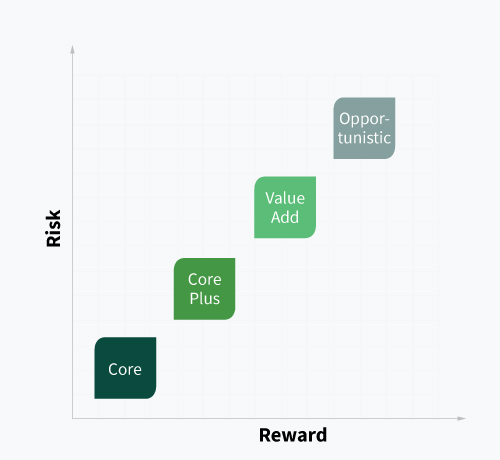Investing in commercial real estate (CRE) can be daunting. While CRE as an alternative investment is not a novel concept, there is much to consider when buying property and developing a robust strategy. Here are a few tips to help you get started before investing in commercial real estate property, as it’s important to understand the fundamentals.
1. What is Commercial Real Estate?
It’s important to clarify which types of properties qualify as “commercial real estate.” Generally, CRE is any property used for business, or any building that is intended to generate a profit. That’s why multifamily housing is also considered commercial real estate.
CRE can also include warehouses, retail spaces, mobile home complexes, industrial parks, medical offices, hotels, storage facilities, office buildings and more.
2. Know Your CRE Asset Strategy
While every investment property is unique, there are generally four primary CRE investments strategies: core, core-plus, value-add and opportunistic.
Commercial Real Estate Asset Classes

The most common strategies in real estate crowdfunding are value-add and opportunistic deals.
A diversified CRE portfolio contains a variety of investment categories depending on the risk tolerance of each investor.
Learn more about the primary investment strategies in commercial real estate investing.
3. Partner with a Reputable CRE Sponsor or Online Real Estate Investment Platform
When considering how to invest in commercial real estate, the first thing to take into account is who to partner with for the transaction. Partnering with a reputable real estate sponsor or real estate platform requires educating yourself about how successful the sponsor or platform may be.
If you are looking to invest with a commercial real estate sponsor or platform, there are a few things you can look for to determine an optimal fit.
- Personality matters: A sponsor or platform will have general information on their website where you can learn about their investment philosophy and investment portfolio of previous projects.
- First impressions: Look at the sponsor’s or platform’s online and offline presence. Get a feel for the level of professionalism in your communications.
- Bigger picture: Learn about the sponsor’s or platform’s strategy. Is there a specific niche that they work with? Who have they worked with before?
All of these characteristics will give you a better idea of whether your potential sponsor or real estate investment platform is a good fit for you.
Partnering with a reputable sponsor or platform should not be overlooked as an important first step in investing in or buying commercial real estate.
4. Understand the Metrics that Matter
When you’re looking to invest in commercial real estate, there are several metrics you can use to evaluate a real estate deal. These deal metrics can give you a better idea of the property’s true price and the profit you might be able to make.
Equity multiple
Equity multiple is also known as the realization multiple. Put simply, it is the ratio of investment returns to paid-in capital. It is the cumulative distributed returns divided by the amount of paid-in capital. While equity multiple is an important tool to evaluate a commercial real estate deal, it does not account for one important factor: time. Equity multiple is best used with the internal rate of return (IRR) to provide a better overall picture of the distribution cycle.
Internal rate of return
What is IRR and why does it matter? IRR is one of the most common metrics used to gauge investment performance. It is the annualized rate of earnings on an investment. One general rule an investor might follow is that the higher the IRR, the higher the return and the lower the IRR, the lower the risk. But that is not always the case. Learn more about IRR here.
Cash on cash return
What is the cash on cash return and how is it used? The cash on cash return is the ratio between annual operational net cash flow and the total amount of cash (equity) invested in the deal. It is used by sponsors when acquiring a property to understand the current and future income profitability on their initial invested capital. This is a good measurement tool for investors to use when they are comparing an equity real estate investment to other income producing vehicles, such as bonds or preferred equity investments. To learn more details about the cash on cash return, check out our in-depth article here.
5. Understand Due Diligence in Commercial Real Estate
The importance of performing proper due diligence cannot be overstated. One of the benefits of partnering with an experienced deal sponsor is that they have the expertise to perform due diligence, such as reviewing the financials, risk assessments and overall viability of the business plan for the property. ArborCrowd performs an important, but often overlooked, part of the due diligence process: the sensitivity analysis. This analysis is done to understand how vulnerable a real estate investment’s yield is to changing economic circumstances.
In Summary
When getting started with commercial real estate, it’s critical to partner with those who have experience in the field. In addition to crunching the numbers, consider the time it takes to accrue returns, and the current economic environment in order to make the smartest and most successful financial decisions.
To learn more about how to invest in commercial real estate, visit our learning center.
